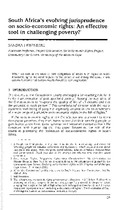| dc.contributor.author | Sandra, Liebenberg | |
| dc.date.accessioned | 2019-10-07T09:37:15Z | |
| dc.date.available | 2019-10-07T09:37:15Z | |
| dc.date.issued | 2002 | |
| dc.identifier.citation | Liebenberg, S. 2002. South Africa's evolving jurisprudence on socio-economic rights: An effective tool in challenging poverty. Law, Democracy & Development. 159-191 | en_US |
| dc.identifier.uri | http://hdl.handle.net/10566/4980 | |
| dc.description.abstract | The drafters of the Constitution clearly envisaged a far-reaching role for it in the transformation of post-apartheid society.' Among the key aims of the Constitution is to "improve the quality of life of all citizens and free the potential of each person".4 This constitutional concern with the socioeconomic well being of people is especially evident in the entrenchment of a wide range of justiciable socio-economic rights in the Bill of Rights." If the socio-economic rights in the Constitution are to amount to more than paper promises, they must serve as useful tools in enabling people to gain access to the basic social services and resources needed to live a life consistent with human dignity. This paper focuses on the role of the courts in promoting the realisation of socio-economic rights in South Africa. | en_US |
| dc.language.iso | en | en_US |
| dc.publisher | Law, Democracy & Development | en_US |
| dc.subject | Socio-economic rights | en_US |
| dc.subject | South Africa | en_US |
| dc.subject | Reasonableness | en_US |
| dc.subject | Progressive realisation | en_US |
| dc.subject | Minimum core obligation | en_US |
| dc.title | South Africa's evolving jurisprudence on socio-economic rights: An effective tool in challenging poverty | en_US |
| dc.type | Article | en_US |

